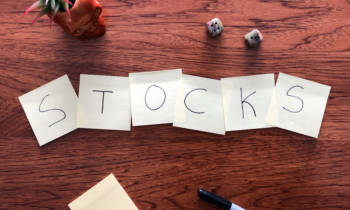The dividend yield does not help with valuation. Often retired people or anyone who wants a supplemental income or want a passive source of income buys high dividend yield stocks. I personally think a lot of rookie investors buy into high dividend yield stock assuming that the dividend income is as secure as a government bond payment.
So, what does dividend yield tell us about valuation? If you notice, most high dividend-yielding stocks trade at low PE multiple. PE is a price to earnings ratio. Or market capitalization of the company divided by its earnings. Or the price of one share divided by earnings per one share. The ratio is lower because the analysts do not expect growth in earning. And often possible they expect earning degrowth. If earning falls per share, the PE will go up automatically, provided the stock price is constant.
Earning re-rating is one cause why the stock price may correct. But, there is another scenario when a company can declare a special dividend. For example, if a company sells off one of its businesses and gets cash, it might decide to distribute that cash among shareholders as a special dividend. That special dividend might push up the dividend yield, but in that case, the stock price should not fall much, and PE ratio should not come down substantially. Make sure you do your research to find out why the price of the stock fell.
What is Dividend Yield?
The cash dividend a stock pays helps us to calculate the dividend yield. Say a stock of company XYZ inc. is being sold at $10 and every year this stock generally pays $1 as a dividend. Then the dividend yield for this stock would be (1/10)*100=10%
Please note S & P 500 currently pays a dividend yield of 1.88%. Any dividend yield above 6% for a stock, is considered too high and most probably not sustainable.
What is PE ratio?
PE ratio is the price to earnings ratio. So in other words, the price of one common stock divided by earning per share gives us the price to earnings or PE ratio. An important point to remember the earning per stock or EPS is trailing earning or past year earning and does not indicate future earning.
When analysts predict downfall in earning, they derate or rerate the stock, essentially what that means is stock price comes down. At that point the PE might appear lower but often when the annual EPS comes out, you will notice due to significant earning fall the PE has gone up.
What is Payout Ratio and what does it tell us?
When you are looking into stock for dividend, the payout ratio is a very important factor that you absolutely cannot ignore.

First, open finance.yahoo.com and in the search bar type is the stock name and open the summary page. Navigate to Statistics tab. Then scroll down and you will find the Payout Ratio.
In the above example, Rio Tinto has a payout ratio of 38%. That means Rio pays $38 as dividend to shareholders for every $100 retained earning.
The lower the payout ratio, the more cash the company has to expand its business and in the future, they can increase their dividend too. Or with the retained cash they can pay down debt faster. With a higher payout ratio, it is the other way, the company probably is not putting any cashback to grow, or it cannot pay down debt faster. And you should not expect any dividend hike either. So seek a company with a lower payout ratio.
How to do the valuation of an income stock?
You can apply 10 cap rule while analyzing if dividend income is a profitable one. Say one stock is worth $50 and it pays you $5 in dividend, which is a 10% yield. That means, in 10 years your holding cost for the stock will be zero. But, if a stock yields for 10% for a long time, I would assume there is something wrong with the company.
But if you can get a deal like that due to the market crash, that will be great. Keep your eyes open in the oil and gas sector, mining sector, REIT, MLP, etc. Growing companies usually reinvest cashback in business. And ideally speaking that is the best use of your cash.
But you need to remember, the dividend can go down or the company can decide not to pay out any dividend. As retail investors, we won’t be able to do anything about it. So, choosing a high dividend-yielding stock is not easy. You will need to do homework to choose correct stock for the long term.
Say a company generates a 20% return on equity. If that company uses all the cash to reinvest and grow, your money will grow at 20% and you do not have to pay any tax on that. That is why Warren Buffet does not pay a dividend to BRK stockholders. If you get the cash in the form of a dividend, there is not much chance you will be able to compound it at a 20% rate. Not all companies generate that kind of return on equity but great businesses such as Apple, Facebook, Chipotle does.
So, consider that before you decide to buy an income stock before growth stock. If you are a long-term investor, you should focus on growth stock to maximize compounding. Dividend income is for people who are looking for a passive income.
How do I find high yield dividend stocks?
A very good starter resource is themotleyfool.com. A lot of analysts are publishing free articles there. And they publish income stock ideas too. But they are not our financial advisors, I would imagine they have a disclaimer somewhere that is meant to inform us, they do not care if we lose money following their articles.
But you can get ideas to begin your research on. Once you get the names and read the short (actually very short) report there, try to analyze if what is written there makes sense and what are the risks. Next thing you need to do is to go to the website of that company. And go to the Investor Relation section. Find out the latest annual report. Or listen to the latest earning call.
Before you decide to invest make sure you know the risks. How much debt the company has? Does it produce enough cash to pay it’s debt off? What is the payout ratio? Does the company have any growth prospect? What is the future of the company?
The quantitive information can be obtained from sites like yahoo finance but to get the qualitative information you will need to know the management and read annual letters.
Is the dividend yield guaranteed?
Recently GE had cut the dividend because it has too much debt. Gamestop stopped its a dividend. It does not have any future. Not enough people go to their stores. So instead of paying a dividend, they want to pay down their debt. These are a few recent examples. So you understand why we need a durable business that produces enough cash to fund growth and dividend.
Moreover, it should not be a zombie company and should have a future business plan. Utility companies such as energy companies or internet and phone providers usually pay out good amount cash as a dividend. Although those are Capex heavy companies, they generate steady cash flow.
But as they need cash to do capital expenditure or do takeovers to expand the business, they often carry a lot of debt in book/balance sheet. A good example is AT&T. Due to heavy debt load and stressed balance sheet the stock is cheaper than Verizon but offer higher dividend yield.
I feel these utility stocks are a safer bet. Especially those which are upgrading towards the future. Like diversifying portfolio from crude to renewable energy. And these phone and internet companies are often a good choice for income stocks. Although these do not have a great earning growth potential they have stead earning to support the dividend pay-out.
There are auto manufacturing companies such as Ford that offer good dividend yield. But auto is a cyclical sector. And during a recession, the earning goes down for these companies.
Related Questions
Why does earning fall for a company?
Earning might fall due to a secular market trend change. A structural problem in the company. Business downturn due to the economic downturn. If we buy businesses during an economic recession for a cheaper price, we can expect to make a good profit when the economy recovers. You can notice when bad economic news coming out of the USA or China the mining, oil and gas-related stocks tumble due to earning concern.
How much tax do I need to pay on dividend income?
Chances are your tax rate on dividend income will be lower than the regular income tax rate you are charged with. But please check with your tax consultant or accountant.
How did you select your income stock? Did you just focus on dividend yield? Or did you check PE ratio or something else? If you want to know how to choose high dividend yield stocks, I made a blog post on that, which can be found here.
Photo by GotCredit

